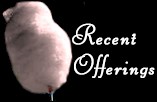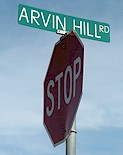Film and Fear
The undercurrent of drenched diaper fear running through many of the reviews is noteworthy.
Michael Phillips, arts critic for the Chicago Tribune:
No, one doesn't have to be a "neocon" to believe violence inflicted on the citizenry by its government is sometimes justified while armed struggle against a tyrannical, lawless government never is. By all appearances, most Americans agree with Mr. Phillips, but that doesn't make them neocons. What it makes them is host organisms for today's dominant parasitic political ideology.
As to the question Phillips asks and mistakenly believes he answers, the film simply could not have been set in America, and the reason has nothing to do with box office prospects or the original setting in the graphic novel. It has everything to do with with the very real climate of fear that's been dropping IQ points and vertebrae in the Home of the Brave since September 2001. Setting aside this point (as if a thinking person can), Phillips' assertion that V4V would have been a box office flop had it been produced with American landmarks is merely wishful thinking on his part.
Movie critics are no different from the rest of the population. They've been scared shitless for years, and cloaking their fear with smarm and condescension is a predictable and transparent reaction, vastly more comfortable than the alternative of honestly confronting the difficult questions of armed struggle against tyranny.
Scott Foundas, LA Weekly:
Speaking of tyranny:
Michael Phillips, arts critic for the Chicago Tribune:
Call me a neocon -- that'd be a first -- but this film is in fact about a glam-terrorist who believes in better government through the demolition of landmark buildings. It's only a movie. But would "V for Vendetta" stand a box office chance today if it were set in America, not England, and the U.S. Capitol were blowing up instead of Parliament? Unlikely. We all enjoyed seeing the White House get it in "Independence Day," but there's nothing political about space aliens.Tell it to the space aliens.
No, one doesn't have to be a "neocon" to believe violence inflicted on the citizenry by its government is sometimes justified while armed struggle against a tyrannical, lawless government never is. By all appearances, most Americans agree with Mr. Phillips, but that doesn't make them neocons. What it makes them is host organisms for today's dominant parasitic political ideology.
As to the question Phillips asks and mistakenly believes he answers, the film simply could not have been set in America, and the reason has nothing to do with box office prospects or the original setting in the graphic novel. It has everything to do with with the very real climate of fear that's been dropping IQ points and vertebrae in the Home of the Brave since September 2001. Setting aside this point (as if a thinking person can), Phillips' assertion that V4V would have been a box office flop had it been produced with American landmarks is merely wishful thinking on his part.
Movie critics are no different from the rest of the population. They've been scared shitless for years, and cloaking their fear with smarm and condescension is a predictable and transparent reaction, vastly more comfortable than the alternative of honestly confronting the difficult questions of armed struggle against tyranny.
Scott Foundas, LA Weekly:
I’m not quite sure what’s more contemptible — that V for Vendetta wants us to take all of this seriously or that, on some level, it doesn’t. It’s selling armed revolution in much the same way the movie version of Rent was selling beatnik counterculture — as a fashion accessory to be sported alongside your tattoo, pierced nipple and Che Guevara T-shirt. The script is loaded with lofty talk about people who’ve been killed while defending their ideas; Malcolm X’s “On Black Power” speech even comes on the soundtrack underneath the closing credits. Not once, however, does V for Vendetta seem the least bit conflicted about its endorsement of fighting terror with terror, or concerned about exalting the legacy of Fawkes at a time when one needn’t buy a movie ticket in order to see London (to say nothing of New York and Washington, D.C.) going up in flames. At this rate, it surely can’t be long before the members of the Weathermen are reconstituted as action figures in a McDonald’s Happy Meal. It may be V who wears the mask, but it’s the Wachowskis who should be ashamed to show their faces.Don't worry, Scotty. Jerry Bruckheimer will be here shortly with your hotdog and apple pie.
Speaking of tyranny:
Reporters who write about government surveillance could be prosecuted under proposed legislation that would solidify the administration's eavesdropping authority, according to some legal analysts who are concerned about dramatic changes in U.S. law.At this late hour, I'm delighted to watch the situation deteriorate because the press needs to have the same knobby fucking boots pressed against their swaller pipes just like everyone else. I truly wish it wasn't necessary, but the ghost of the Fourth Estate remains oblivious to the reality that the public's fate is ultimately its own. When the institution of journalism abandons its shamelessly corrupt elitism, I'll abandon my desire to see journalists brought to their fucking knees by the very criminals they currently serve.
But an aide to the bill's chief author, Sen. Mike DeWine, R-Ohio, said that is not the intention of the legislation.
"It in no way applies to reporters — in any way, shape or form," said Mike Dawson, a senior policy adviser to DeWine, responding to an inquiry Friday afternoon. "If a technical fix is necessary, it will be made."
The Associated Press obtained a copy of the draft of the legislation, which could be introduced as soon as next week.
The draft would add to the criminal penalties for anyone who "intentionally discloses information identifying or describing" the Bush administration's terrorist surveillance program or any other eavesdropping program conducted under a 1978 surveillance law.
Under the boosted penalties, those found guilty could face fines of up to $1 million, 15 years in jail or both.
Kate Martin, director of the Center for National Security Studies, said the measure is broader than any existing laws. She said, for example, the language does not specify that the information has to be harmful to national security or classified.
"The bill would make it a crime to tell the American people that the president is breaking the law, and the bill could make it a crime for the newspapers to publish that fact," said Martin, a civil liberties advocate . . . .
Lucy Dalglish, executive director of the Reporters Committee for Freedom of the Press, said the language would allow anyone — "if you read a story in the paper and pass it along to your brother-in-law" — to be prosecuted.
"As a practical matter, would they use this to try to punish any newspaper or any broadcast? It essentially makes coverage of any of these surveillance programs illegal," she said. "I'm sorry, that's just not constitutional."















<< Home